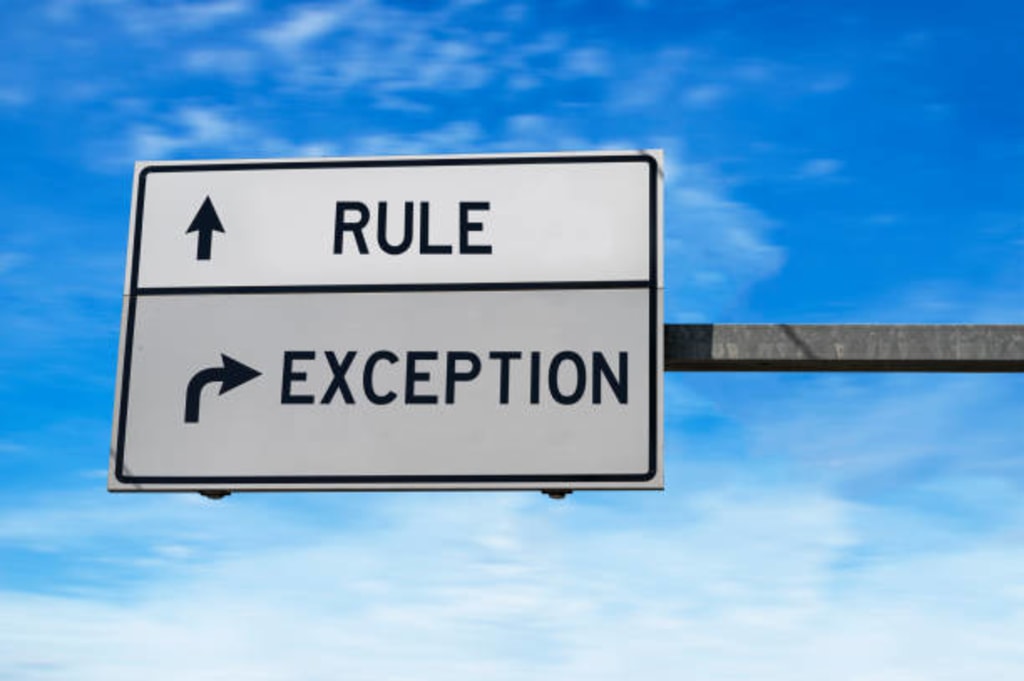The Power of Exceptions: Why Flexibility is Key to a Just Society
Discover how exceptions in rules can lead to a more adaptable and equitable world!

Imagine a world where rules are like a straitjacket, confining us to a rigid set of laws and regulations. Sounds suffocating, right? But wait, what if I told you that there's a secret escape hatch in every rule? A small loophole, a gray area, a provision for exceptions. That's right, folks, in this world of ours, every rule has its exception, and it's these exceptions that make the rules flexible, adaptable, and ultimately, human. Join me as we unravel the mysteries of why there's an exception to every rule and discover the beauty in the nuances of life.
Rules and Exceptions: Understanding Their Interplay
Understanding Their Interplay delves into the delicate balance between structure and flexibility. Rules are established to provide order and ensure safety, but they can also be inflexible and restrictive. Exceptions, on the other hand, allow for a certain degree of flexibility and nuance in the application of rules. Without exceptions, the world would be a much more rigid place, and we would be unable to adapt to new situations and unique circumstances.
The interplay between rules and exceptions is a complex one that requires careful consideration. On one hand, rules provide the foundation for our societies and are essential for maintaining order and safety. On the other hand, exceptions allow for the flexibility and adaptability that is necessary for our world to function.
For example, in a traffic rule, one might say that "vehicles must stop at a red traffic light". But what about emergency vehicles such as ambulances, fire trucks, and police cars? They are allowed to proceed through a red light with their sirens on, as an exception to the rule. This allows for the safety of others and can save lives.
Gray Area of Rules and Exceptions:
Gray Area explores the complexities of rulemaking and the nuances of life. In a world where rules are supposed to be black and white, exceptions are the gray areas that provide room for flexibility and adaptability.
We often think of rules as absolute, but in reality, there are always going to be gray areas where the rules are not clear-cut. These gray areas, or exceptions, allow for unique circumstances and new developments to be taken into account. So, the gray areas of rules and exceptions are what make our world more dynamic and nuanced. It's important to remember that rules are not always absolute, and exceptions allow for flexibility and adaptability in their application.
Balancing Rules and Exceptions!
This delves into the delicate equilibrium between structure and flexibility. Rules provide the backbone of our societies, ensuring safety and order, while exceptions allow for adaptability and nuance in their application. Striking the right balance between the two is crucial for creating a just and fair society.
Imagine a tightrope walker, carefully balancing on a thin wire, one misstep could mean a fall. Similarly, when it comes to rules and exceptions, finding the right balance is crucial. Too many rules and not enough exceptions can lead to inflexibility and rigidity, while too many exceptions and not enough rules can lead to chaos and anarchy.
For example, in a traffic rule, one might say that "vehicles must stop at a red traffic light". But what about emergency vehicles such as ambulances, fire trucks, and police cars?They are allowed to proceed through a red light with their sirens on, as an exception to the rule. This allows for the safety of others and can save lives; this is an example of balancing the rule and exception.
Do you know?
Do you believe that the concept of exceptions in rules can be traced back to ancient Greece? The philosopher Aristotle believed that laws should be general, but also flexible enough to adapt to unique circumstances. He proposed the concept of the "doctrine of the mean" which stated that laws should be balanced between too much and too little, allowing for exceptions to be made in specific cases. In other words, the ancient Greek philosopher understood that exceptions in rules are necessary to strike a balance between strict adherence and total flexibility.
So, understanding the interplay between rules and exceptions is crucial for creating a just and fair society. Rules provide the foundation for our societies and are essential for maintaining order and safety, but exceptions allow for the flexibility and adaptability that is necessary for our world to function. Like the two sides of a coin, rules and exceptions are inseparable, and it is through striking the right balance between the two that we can navigate the nuanced world we live in. So, remember,
"Rules are the compass, exceptions are the adventure."
About the Creator
agamagizh_Rasikaa
Join me on this journey of reading discovery, and let's unlock the magic of words together.






Comments
There are no comments for this story
Be the first to respond and start the conversation.